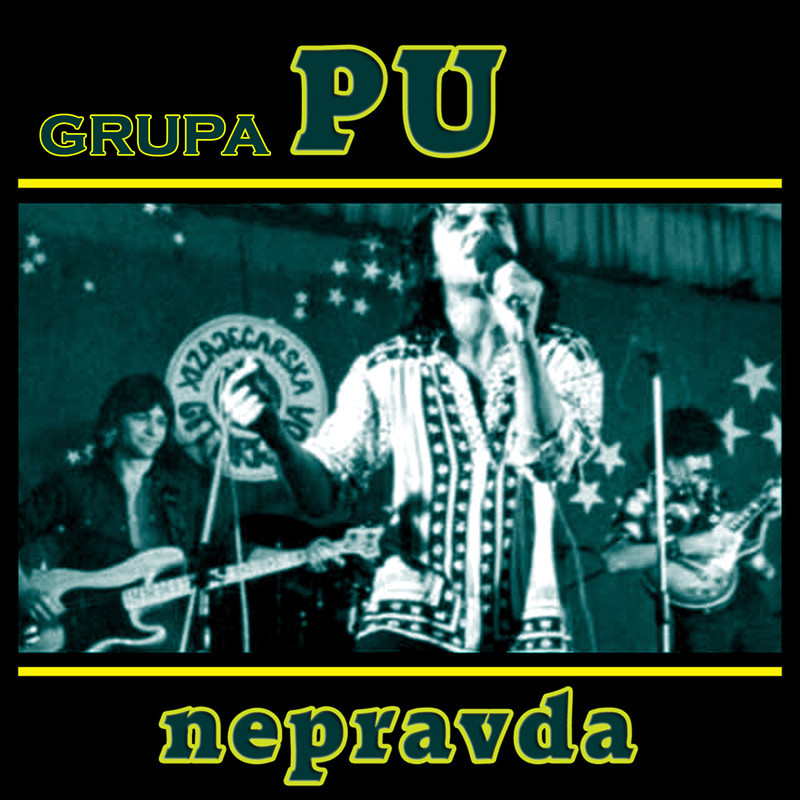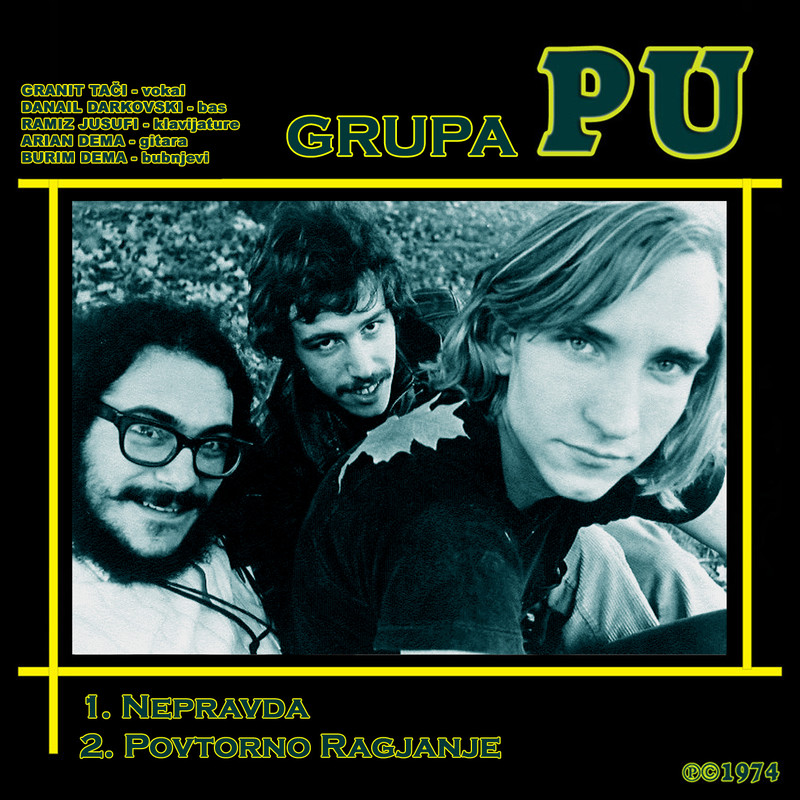ponedjeljak, 31. srpnja 2023.
nedjelja, 30. srpnja 2023.
GRUPA "I" - Na svom talasu (1980)
GRUPA "I" was formed on January 1979 by guitarists Dejan Kostić and Predrag Mijović, drummer Branko Kuštrin "Mango", bassist Branko Kojić, and vocalist Branko Bogićević. The lineup recorded their debut single "Sestra Vera", with "Miris ulice" as the single B-side, released by PGP-RTB in 1979, after which Bogićević left the band, and bassist Kojić took over the vocal duties. The debut album "Na svom talasu", released by PGP-RTB in 1980, presented a combination of diverse musical influences, including hard rock, power pop, ska and reggae. The album, recorded at the PGP-RTB studio V, during the Summer 1980, featured the prominent tracks "Tinejdž bluz", "G.S.B-S.O.S.", "Jugo rok", featuring a quotation from the chorus of the Vatreni Poljubac song "Doktor za rokenrol", and "Mirela", was produced by Slobodan Marković, who also appeared as song arranger and guest keyboard player. After the album release, guitarist Predrag Mijović left the band, quitting his musical career and moving to Botswana. In the meantime, the band had released the single "Sa tobom, bez tebe", with "Bekstvo" as the B-side. The B-side appeared on the following studio album, "I zvuci za I ljude", also featuring the notable tracks "Nove vrednosti" and "Složena procedura opstanka", mainly ska oriented. Guest appearances featured Vuk Vujačić (saxophone) and Disciplina Kičme frontman Dušan Kojić "Koja" (backing vocals), who also produced the dub version of "Nove vrednosti" which appeared on the four-track EP of the same name, released in 1982 by PGP-RTB. After the EP release, the band ceased to exist. (from wikipedia)
subota, 29. srpnja 2023.
SJENE - Sjene (1962-1963)
SJENE were one of the first rock and roll band in Croatia (ex-Yugoslavia). They formed in Zagreb, in 1961, under directly influence by the british band The Shadows. They recorded only a few songs.
STELLA - Anno Domini 1193 (1990)
petak, 28. srpnja 2023.
ISTOČNI IZLAZ - Istočni izlaz (1981)
četvrtak, 27. srpnja 2023.
JUTRO (Ljubljana) - Dobro jutro (1980)
JUTRO was formed in Ljubljana, Slovenia, in 1970 with original line-up: Zoran Crnković (guitar), Marjan Frol (bass) and Pavle Ristić (drums). Later on Miro Tomassini (bass), Dragan Gajo (drums) and Alan Jakin (guitar) replaced Frol and Ristić. In the beginning they performed boogie rock, but during the mid-70s played cover versions of classical music works, notably that of Mozart, much in the vein of Dutch band Ekseption. They performed their prog rock version of "Eine Kleine Nachtmusik" at the famous BOOM Pop Festival '73 in Ljubljana. Ristić came back for the recording of the 7" single "Prema suncu/Mozart" in 1976, containing the repeated cover of the mentioned classical work. In 1978, when Lado Jakša (saxophone) and Jordan Gancev (keyboards) joined the group, JUTRO changed the style and started playing jazz-rock. They released only one album "Dobro jutro", which went unnoticed during the New Wave boom in ex-Yugoslavia in 1980, and the band slowly disappeared from the scene. (by Sead S. Fetahagić)
srijeda, 26. srpnja 2023.
DALTONI - Kolekcija (1968-1970)
DALTONI was a Serbian and former Yugoslav rock band, notable for being one of the pioneers of the former Yugoslav rock scene. The band was formed in Niš in August, 1963 by Branislav Cvetković (who at first took up guitar but soon switched to bass guitar) Žarko Stanković (guitar), Rista Trajković (rhythm guitar) and Nebojša Stojanović (drums). At first the band mostly performed cover versions of Hank Marvin and The Shadows instrumentals, but for their first public appearance, at the Gimnazijada festival in Skopje the band was joined by vocalist Miodrag Rašić. The band had their first public appearances in Niš in 1965, at the cult club Index, where vocal duties were given to Dušan Mitrović and Miša "Šolja" Tašić, and Mihajlo "Mika" Paligrdić was temporarily the band's drummer. The band was soon joined by keyboardist Miodrag "Miško" Stojanović. In 1966 Rašić officially left the band, and was replaced by Goce Nikolovski from the rival group Rubinsi. The new lineup presented themselves for the first time at the Faculty of Technical Science in Niš on November 29, 1966, which presented the band to a wider audience and contributed the band's growing popularity. In January 1967 Daltoni won the first place at Belgrade's second Guitar festival. On May, the band performed at the Zagreb VIS Competition, where, among the most popular bands at the time, won the first place. On September of the same year they won the first place at the first Niš Guitar festival. On October 30, the band organized their first concert in Belgrade, performing cover versions of The Beatles' songs, including most of the tracks from the, at the time popular, album "Sgt. Pepper's Lonely Hearts Club Band". By the end of 1967, the band had already changed the lineup with Trajković and Cvetković being replaced by Žarko Bajagić (bass guitar) and Dragan Nikolić (rhythm guitar), both former members of Rubinsi. The following year, the band performed at the Sajmište in Skopje and prepared their EP "Ruka od sna", released by Jugoton. The EP featured four tracks: "Petak", "Vraćam se ponekad u prošlost", "Volim našu istinu" and the title track which saw some radio success. At the time, the band had been working with Laza "Baron" Stanković, who became their manager. Having released the EP, the band went on a Serbian tour, performing first in Niš, on December 1968, at the Park cinema, and a few days later, on December 25, at the Zlatna Gitara festival in Belgrade ending up at the fourth place. At this performance, keyboardist Rade Radivojević performed for the first time. During the summer of the following year, the band's new manager Zoran Pešić organized an Adriatic seaside resorts tour including the MOC festival in Bečići. On their return, the band held a concert at the JNA Dome, and on March 8, the band organized a marathon concert on which they performed for twenty-eight hours, beating the record held by the band Čičak for about two hours. During the concert Daltoni performed over three hundred songs. During the same year, the band moved to Belgrade and on May performed at the Pop zvezde '70 festival. With the new keyboardist Josip Kolbert, the band performed at various venues including the Euridika club or the Belgrade's Dom Omladine, expanding their repertoire with the up-to-date hits, thus changing the musical style. At the time, central part of the band's performance were cover versions of bands such as Jethro Tull, Family, Blood Sweat & Tears and Sly and the Family Stone. In mid-1970, Radivojević returned to the band and drummer Stojanović went to serve the army, being replaced by Mika Paligorić. This lineup performed Faculty of Civil Engineering and prepared new material, which was recorded at the studio of Niš Radio, but the material was not released. In the meantime, on May, the band went on a tour to Istra performing in Pula and Savudrija, and returning to Niš in October, when the band officially disbanded, although during the 1970s some of the members performed under the name Daltoni. (from wikipedia)
utorak, 25. srpnja 2023.
NOĆNA SMJENA - Vrtlog (1980) Single
F. GUN - Demo Tracks (1987-1989)
ponedjeljak, 24. srpnja 2023.
STRUČNI NALAZ - Radnici i radnice (1984) Single
nedjelja, 23. srpnja 2023.
GORDAN BALABANIĆ - Jesen je... (1970) EP
subota, 22. srpnja 2023.
KARLOWY VARY - La Femme (1985)
petak, 21. srpnja 2023.
četvrtak, 20. srpnja 2023.
BULDOŽER - Ako ste slobodni večeras (1982) 2CD
After Marko Brecelj left BULDOŽER wishing to make a solo-career, Boris Bele took over the frontmanship. He proved he should not be taken lightly, and continued the Brecelj's style of excesses and provocation. The double live album "Ako ste slobodni večeras" featured the kidding of all kinds. Intermezzos between songs were filled by made-up interviews of Dražen Vrdoljak with the "public" on the topics of Buldožer's favorite themes—sex, drugs and Goran Bregović. The album contained covers of "Roll Over Beethoven", renamed to "Ko jebe Buldožer", and verses from Pink Floyd's "Another Brick in the Wall" were sung to the melody of "Oj, svijetla majska zoro". Arguably the greatest excess on the record, though, was Bele's longish obituary to Džoni Štulić, who supposedly burned himself as sign of protest for the Poland crisis. (from wikipedia)


















































